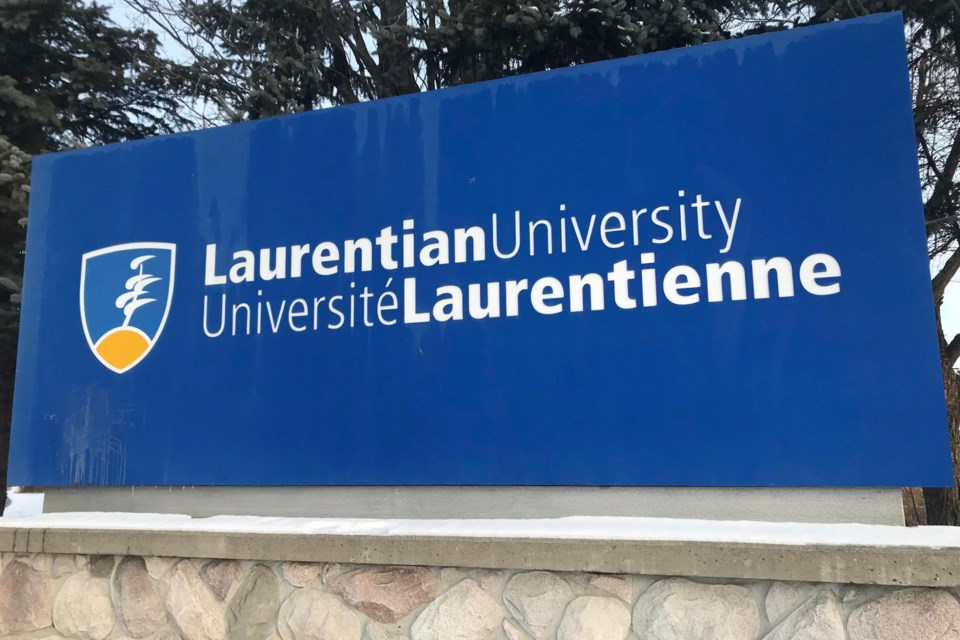Open meetings are the default of university governing bodies, but there are times when the “default becomes problematic.”
So stated one of the slides in a presentation on open, closed and in-camera sessions at the Feb. 11 meeting of Laurentian University’s senate, which is one of LU’s two governing bodies, along with its board of governors.
The presentation was made by university secretary Danielle Vincent at the request of LU president Lynn Wells.
Wells, who began her term as president last spring, said it was her understanding that it’s a tradition for the president to engage members in a conversation relating to good governance during each February senate meeting.
“Since we had had conversations recently about the use of open and closed sessions, this was proposed at SENEX (the senate executive committee) as the topic for today,” said Wells.
Possible changes to in-camera and closed door meeting rules at Laurentian University’s senate are being considered amid reported concerns about media coverage. Sudbury.com is the only local media outlet that regularly covers these meetings.
The university said it is “modernizing” its governance practices, including developing clear, transparent guidelines about when a discussion might move into closed session or in-camera.
Vincent said there are three types of sessions in university governance meetings: open sessions, which are open to the public; closed sessions, in which motions and decisions can be made, but the public is excluded, and; in-camera sessions, which are limited to members of the governing body, and decisions are not made.
“Most would likely agree that transparency is a cornerstone of good governance,” said Vincent, in her presentation.
“That being said, there are times where transparency will clash with the need for confidentiality. And so what happens then? Today, I'll be exploring the balance between open, closed and in-camera sessions and best practices in governance.”
Given that universities receive public funding, open meetings are the default, she said.
“Universities have tended to open up their governance processes to the public by having their discussions in open session as the default open sessions mean that anyone can attend and watch how the decision making process unfolds,” Vincent said.
But “where do we run into problems?” she said. “Those arise because transparency isn't the only consideration. There are times where there are other considerations competing with transparency as a pressing objective.”
Vincent said providing access to “sensitive student information” or “unrestricted access to discussions on certain topics” could pose risks, “whether that is to individuals, to the institution's strategic interests or even compliance with privacy laws.”
“So while transparency is a priority, it shouldn't come at the expense of causing harm to the institution,” said Vincent, who added that universities operate in a "competitive environment.”
“Striking the right balance then means recognizing when confidentiality is necessary to protect individuals' sensitive information, or the university's long-term strategy.
“Striking that balance then sometimes means needing to exclude the public, to allow governing bodies to have important discussions without causing undue harm to the interests of its students, employees or the university itself.”
Recent meetings of LU’s senate have included several lengthy closed sessions.
During the December meeting, a presentation on the 2025-2030 academic plan and strategic research plan preliminary plan frameworks was closed, as was a presentation on 2025-26 budget development by provost Malcolm Campbell.
Another presentation on the 2025-2030 academic plan and strategic research plan was also done in a closed session at the January senate meeting.
Both the academic plan and strategic research plan were approved at the February senate meeting, along with key performance indicators for the strategic plan.
The February senate meeting featured a closed session on a report on the Efficiency and Accountability Fund, a review of post-secondary institutions by the province.
Senate member Markus Timusk asked what could be learned from Vincent’s presentation for how meetings of Laurentian’s second governing body, the board of governors, are conducted.
“I can say that these principles would apply equally at the level of board meetings, and the board at Laurentian University does strive to meet those principles as part of its operations regularly,” Wells answered.
A question was also raised by senate member Pedro Jugo about closed vs. in-camera sessions, saying decisions have been made in-camera at both board and senate meetings, despite Vincent’s information this shouldn’t be happening.
Vincent said the board doesn’t make decisions in-camera, and as for the senate, perhaps it has been labelling as in-camera what her presentation contemplates as closed sessions.
Laurentian University Faculty Association (LUFA) president Fabrice Colin said he recognizes the need for some closed or in-camera sessions.
But “without a valid justification for these items to be placed in camera or in closed session. I think we should err on the side of transparency,” he said.
(See this previous Sudbury.com article for a fuller elaboration on Colin’s point of view.)
The report on LU’s insolvency by former Ontario Auditor General Bonnie Lysyk mentioned the word “transparency” 21 times, Colin said.
“There's also a lack of trust from some community members who are at Laurentian after the CCAA, and we are also experiencing a decline in our local students at Laurentian University,” he said.
“So all of these are good reasons, I think, to minimize the number of items. Regarding the justification (for closed sessions), that would be a good idea that justification being also provided to senators prior to the meeting, so we can then make this a final decision at the meeting.”
Heidi Ulrichsen is Sudbury.com's assistant editor. She also covers education and the arts scene.
